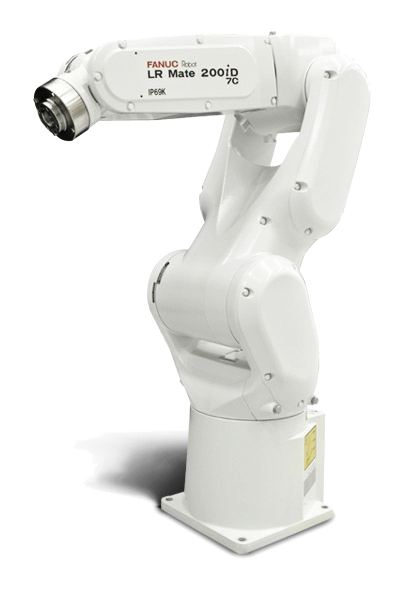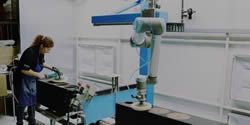The Rise of the Cobots-Friends, Not Foes, in Today's Manufacturing Landscape
Embracing the use of robotics on the production line, or incorporating AI to bring new products to market quickly, can help industrial businesses get noticed by young people and garner more interest in the employment opportunities on offer.
ABB to Build the World's Most Advanced Robotics Factory in Shanghai
Milestone investment will combine connected digital technologies, state-of-the-art collaborative robotics and cutting-edge artificial intelligence research to create the most sophisticated, automated and flexible Factory of the Future.
Tips and Tricks for Implementing Automation in Your Manufacturing Plant
IoT and connected devices are making the development process more transparent. The technology also allows plant managers and overseers to accurately review operations, which leads to a more positive direction for everyone.
Food and Beverage Survey Shows Increasing Output is a Major Driver for Integrating Robots
Adding robot systems to any stage in food and beverage manufacturing will help to increase throughput. Robots work consistently, around-the-clock allowing for dependable production rates. The latest innovations increase production flexibility and decrease changeover time.
Veo Robotics raises $12 million to help machines and humans collaborate more efficiently
BÉRÉNICE MAGISTRETTI for VentureBeat: Sobalvarro and his team are trying to reduce the manual labor humans shoulder in industrial work settings, leaving the heavy lifting to the robots.
CSAIL team pairs robots with VR for smart manufacturing
Malek Murison for Internet of Business: Telepresence robotics and virtual reality are two exciting technologies, and by combining the two in a relatively inexpensive way, engineers at MITs Computer Science and Artificial Intelligence Laboratory (CSAIL) have developed a smarter and safer manufacturing tool.
Spider robots on the move for additive manufacturing
Stuart Nathan for The Engineer: Like several concepts in mobile additive manufacture, the Spider bots grew out of a concept to build bases for exploration on the Moon and other planets.
Achieving Lights-Out Manufacturing with Industrial Robots
Kagan Pittman for Engineering.com: The robot combo has been tasked with automating a black oxide process, which involves dipping parts in various chemical baths in a precise sequence.
The optimist's guide to the robot apocalypse
Sarah Kessler for Quartz: Machines, you may have heard, are coming for all the jobs.
Robots flip burgers and work warehouses. Artificial intelligence handles insurance claims and basic bookkeeping, manages investment portfolios, does legal research, and performs basic HR tasks. Human labor doesn’t stand a chance against them—after the “automation apocalypse,” only those with spectacular abilities and the owners of the robots will thrive.
Or at least, that’s one plausible and completely valid theory. But before you start campaigning for a universal basic income and set up a bunker, you might want to also familiarize yourself with the competing theory: In the long run, we’re going to be just fine. We’ve been here before. Cont'd...
Japan worker shortage has only one winner so far: robots
Leo Lewis for Financial Times: Earlier this week, Japanese TV audiences glimpsed a potentially revolutionary contraption from the Matsue College of Technology that rapidly separates closed shijimi clamshells into those with a live mollusc inside and those without.
Cut to footage of a human sorter, expertly performing the same function at a rate of just 90 kgs of shijimi per day and whose job this machine seems destined to replace. In other parts of the world, the juxtaposition could seem cruel or politically charged; in Japan, it is almost celebratory. The great conundrum for investors — and increasing preoccupation of sellside analysts attempting to talk clients out of underweight Japan positions — is whether the equity market provides a neat play on Japan’s deepening worker shortage and the promised surge in wages that has to date been all gong and no dinner. Cont'd...
Trump promises to bring back manufacturing jobs, but robots won't let him
Lora Kolodny for TechCrunch: For Americans struggling with stagnant wages, under- or un-employment, one of Donald Trump’s most appealing campaign promises was to bring manufacturing jobs back to the U.S.
Navigating the complexities of policy, tariffs and geopolitics would make that hard enough already for the president elect. But technology will make this promise nearly impossible to fulfill.
Why? Because manufacturing jobs are increasingly done by robots, not people.
Robotics have already helped reduce reliance on labor overseas for manufacturers in automotive, electrical and electronics industries, according to a fresh policy report from the United Nations Conference on Trade & Development. Cont'd...
Give a 3D printer artificial intelligence, and this is what you'll get
Dyllan Furness for Digital Trends: A London-based startup has combined some of today’s most disruptive technologies in a bid to change the way we’ll build the future. By retrofitting industrial robots with 3D printing guns and artificial intelligence algorithms, Ai Build has constructed machines that can see, create, and even learn from their mistakes.
When CEO and founder Daghan Cam was studying architecture, he noticed a disconnect between small-scale manufacturing and large-scale construction. “On one side we have a fully automated production pipeline,” Cam explained at a recent conference in London. “On the other side we’re completely dependent on human labor.” With the emergence of more efficient printing technologies, he thought there must be a better way.
“We wanted to push the boundaries of how intricate we could design things through computation and how we could create them through 3D printing,” Cam said. Cont'd...
Is a Robot After Your Job?
Robots may be after your job, but you could be their boss.
Safety solutions for intelligent human-robot collaboration
Fanny Platbrood for SafeToWork: Human-robot collaboration (HRC) describes a work scenario in which humans and automated machines share and work in the same workspace at the same time. Driven by Industry 4.0, this model of collaboration promises highly flexible workflows, maximum system throughput and productivity, as well as economic efficiency. However, ensuring that HRC is actually able to live up to this promise requires exactly the right safety technology for the application in question.
One of the major issues associated with Industry 4.0 is making work processes flexible. At the extreme end of the spectrum, this may involve manufacturing products in batch size 1 under industrial mass-production conditions – that is, manufacturing unique items on a conveyor belt. Cont'd...
Universal Robots Polishes Paradigm to 50% Production Increase
Paradigm Electronics is a manufacturer of high performance loud speakers and subwoofers. In trying to meet demand on labor-intensive products, Paradigm has now implemented Universal Robots in polishing applications, resulting in significantly increased production throughput eliminating bottle necks while improving the work environment.
Records 1 to 15 of 18
Featured Product

Cabinet Cooler Systems
Stop electronic control downtime due to heat, dirt, and moisture! A low cost, reliable way to cool and purge electronic control panels. EXAIR Cabinet Coolers incorporate a vortex tube to produce cold air from compressed air - with no moving parts. https://exair.co/184_540















